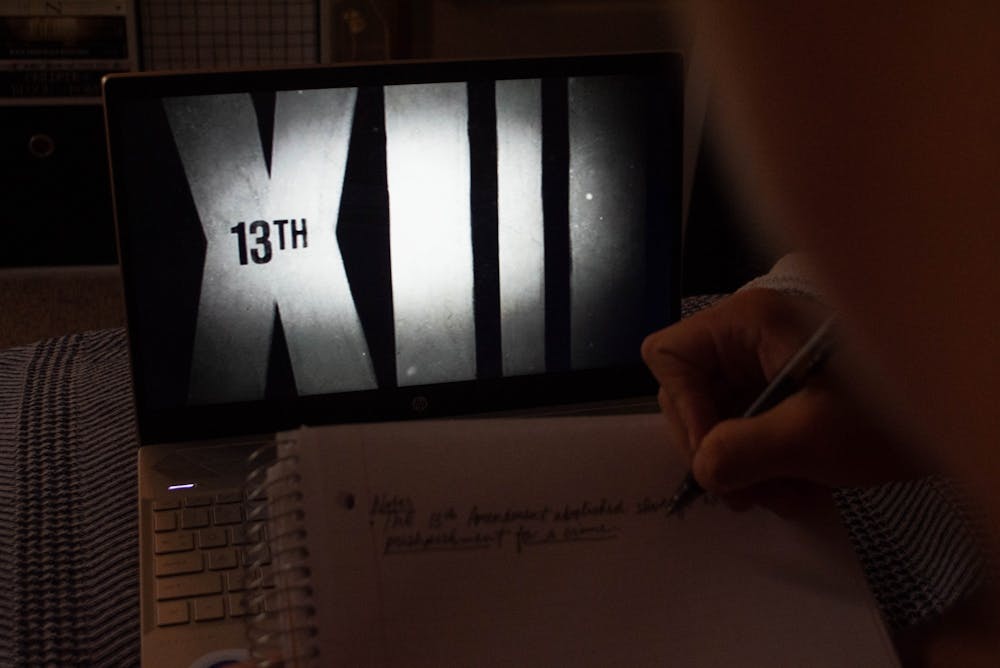“As a campus community, we can somehow hold space for the grief and hurt that comes up for students and for faculty as well,” he said. “Frankly, having a day to rest was beneficial for me, too, because of the political climate and the general feeling of danger that sort of permeates our country at the moment.”
Dana Griffin, a professor in the School of Education, participated in the Scholar Strike in her Tuesday classes by showing Ava DuVernay's documentary "13th" and hosting a brief discussion afterward.
She said her goal for the strike was to stand with those fighting for racial justice, and raise awareness to students and faculty of the everyday racial injustices Black and brown people face in the United States.
For Griffin, the issue of racial justice and police violence hits home.
“I am a Black woman,” she said. “I’m married to a Black man. I’m raising Black children. It’s personal for me. Personally, I face racism and injustice on a daily basis. These things are happening. Just because it’s Chapel Hill doesn’t mean we’re in this bubble.”
Griffin said the Scholar Strike was her way of bringing in the community and changing the narrative surrounding the protests for racial justice.
“When we are standing up, when we are saying Black Lives Matter, when we are saying that these things can no longer exist, that the police brutality must stop — we are not anti-police, we are not anti-whiteness,” Griffin said. “What we’re saying is that we are anti these experiences that we are having — that are happening to us.”
Another faculty member of the School of Education, professor Alison LaGarry-Cahoon, joined the Scholar Strike on Tuesday and used the class time to discuss the origins and importance of the strike with her students.
LaGarry-Cahoon asked her students to research the movement on Twitter for the first few minutes of class before hosting an open conversation.
“Students were very eager to talk about this, particularly students of color in my classes,” she said. “I noted some deeper engagement — I noted more people turning on their cameras and sharing some of their own experiences around racial discrimination, around police brutality, around how we connect that to campus.”
LaGarry-Cahoon said the class discussion and engagement were important because listening to and learning from the experiences of students can be just as valuable as the material she teaches.
In response to police violence against the Black community, Chancellor Kevin Guskiewicz and other University officials released statements in May and June condemning acts of violence against the Black community and detailing measures UNC is taking to foster inclusivity, UNC Media Relations said in an email.
To get the day's news and headlines in your inbox each morning, sign up for our email newsletters.
Lucía I. Mock Muñoz de Luna is a Ph.D. candidate in the School of Education and a graduate teaching assistant for LaGarry-Cahoon’s course. For Mock Muñoz de Luna, this strike was a necessary contrast to the actions the University has taken on police violence.
“I think that this strike is a really important opportunity for us as scholars, as educators, as people who are working the University to make a statement that is a little bit stronger than just your typical email that you get from the University or the administration saying, ‘We support racial justice.’ But, of course, there is not actual action behind that,” she said.
Mock Muñoz de Luna said the University’s resistance to systemic change for racial equity and justice is rooted in its ties to white supremacy.
“UNC has shown over the past few years and throughout its history that it is more invested in white supremacy and upholding white supremacy than it is the safety and well-being of its students,” she said.
During the TA strike in protest of Silent Sam two years ago, she said that she and other faculty members on strike faced threats of retaliation from the University administration around job safety.
UNC Media Relations said in an email that UNC embraces free speech under the First Amendment of the U.S. Constitution and protects this right for its students, faculty and staff.
But Mock Muñoz de Luna said previous threats did not stop her from participating in the Scholar Strike this year.
With more racially and ethnically representative leadership, discussions on white supremacy in the University and active work to dismantle oppressive systems, Mock Muñoz de Luna said she has hope for an equitable and just future for the University.
“We can rebuild the University in a way that is actually just and promotes the well-being and safety of all of our students — not just our white students,” she said.
@cameronmilnee
university@dailytarheel.com




